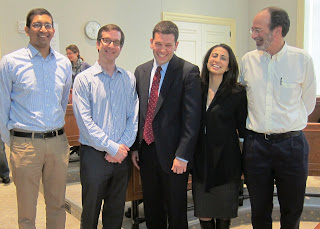His work includes lab and field investigations of charitable giving, of provision of public goods, of cooperation in the presence or absence of contracts, of team production when pay is equal or unequal, and of the decision to be an organ donor.
His job market paper, “Signals of Support and Public Good Provision,” is unusual in the way it combines experiments both in the field and in the lab. The field experiment involves a big national charity’s regional campaign in about 200 firms, covering around 25,000 employees. One of the treatment conditions involved giving out buttons to all employees, which they could wear if they wished to express support for the charity. This turned out to have a surprisingly large effect on giving: it increased the number of donations and the amount donated by about a third. Another treatment involved giving out raffle tickets to those who contributed, and this did not have a positive effect on giving. The hypothesis is that the buttons (unlike the raffle tickets) provide information to coworkers about the level of support the charity enjoys, and that when they receive positive information about this they are more likely to contribute themselves.
But a field experiment is by nature imperfectly controlled, so Judd also conducted a lab experiment modeled on the field experiment (in which subjects also had an opportunity to contribute to a charity), but with careful controls in place to test for alternative hypotheses. The treatments in the field experiments already suggested that we aren’t seeing increased contributions because of gift exchange (i.e. the button isn’t regarded as a gift, as the raffle tickets might be), and what Judd finds in the lab is that the major effect of seeing another subject who has chosen to wear the button is that it increases a subject’s estimate of what the other subject will give, and this appears to be the mechanism through which contributions are increased. (Subjects also contribute more when wearing a pin, so this is a rational expectation.)
Judd’s field experiment and lab experiment complement each other; the lab experiment couldn’t have given a reliable prediction of the magnitude of the effect Judd observes in the field, while the field experiment leaves open many more hypotheses about the cause of this effect than does the lab experiment.
Welcome to the club, Judd.




2 comments:
Perhaps this explains charity walks; any disutility of doing the walk provides a signal that is of higher than compensating value. I wonder, though, whether there would have to be a presumed disutility here for this explanation to work; if a frequent runner signs up for a 5k and tries to raise money (from people who know he does 5k races all the time for fun), is it harder to raise money -- perhaps as hard as "I'm collecting money for {cause}" would be without the race?
Judd Kessler was a student in my econometrics section back when he was an undergraduate and I was a graduate student. He was, unsurprisingly, very good.
I now feel very old.
--SW
Post a Comment